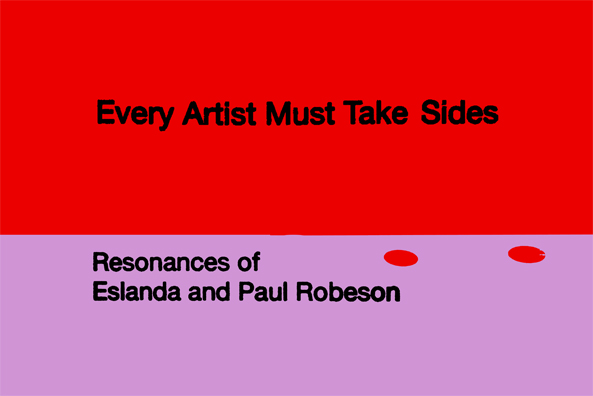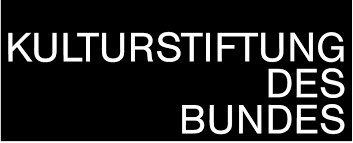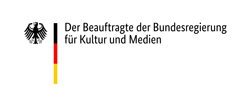Every Artist Must Take Sides – Resonances of Eslanda and Paul Robeson
Exhibition: 14 Nov 2025 – 25 Jan 2026
Festival: 23 + 24 Jan 2026
Akademie der Künste, Hanseatenweg 10, 10557 Berlin

With “Every Artist Must Take Sides – Resonances of Eslanda and Paul Robeson”, the Akademie der Künste explores the legacy of two extraordinary figures of the 20th century. The political and artistic endeavors of Eslanda Cardozo Goode Robeson (1895–1965) and Paul Robeson (1898–1976) were an expression of a way of thinking that understood the world in relations and of an uncompromising resistance to all forms of oppression. An exhibition and a festival both present contributions by contemporary artists and musicians, as well as materials from the Paul Robeson Archives of the Akademie der Künste.
“Every artist, every scientist, every writer must decide now where he stands. He has no alternative. [...] The artist must take sides. He must elect to fight for freedom or for slavery.” This urgent appeal was made by Paul Robeson on 24 June 1937, during a solidarity concert at the sold-out Royal Albert Hall in London, in support of the International Brigades in the Spanish Civil War. The African American singer, actor, trained lawyer, and activist reached a global audience through numerous films, theater and concert performances, political rallies, radio broadcasts, records, and newspapers. African American author, anthropologist, UN correspondent, artist manager, and activist Eslanda Robeson wrote about her travels to Southern, Eastern, and Central Africa and was actively involved in reconstituting the “world community” after World War II, focusing on internationalist women's organizations. Together, the couple linked the anti-racist struggle for civil and human rights in the United States with anti-fascist freedom movements in Europe, international labor movements, and anti-colonial liberation struggles in Asia, Africa, and the Caribbean in the spirit of socialist internationalism.
Paul Robeson’s concerts and engagements, alongside Eslanda Robeson’s research, allowed both to engage with the Black diaspora worldwide, seeing themselves both as part of this diaspora and as global citizens. Eslanda Robeson regarded her writing, and Paul Robeson his voice and keen ear (which likely enabled him to sing in over 20 languages), as “weapons” they strategically deployed. Their stage performances, films, recordings, publications (such as the newspaper Freedom, founded with W.E.B. Du Bois in 1950), as well as postal services and telephone lines, became vital media for their transnational activism and tireless, creative resistance – even against the anti-communist repression, surveillance, and intimidation by the U.S. government during the 1940s and 1950s.
In 1965, in the midst of the Cold War, the Paul Robeson Archives was founded at the former Academy of Arts of the GDR as the first systematic collection of material on the life and work of a Black American artist and on the work of a Black activist and intellectual. Today, the Paul Robeson Archives represent a productive interface of current post-socialist and post-colonial discourses. On the occasion of the archive's 60th anniversary, the project “Every Artist Must Take Sides” opens up a resonance space to relate the legacy of the Robesons and their struggles to the pressing questions of our present.
Artists: James Gregory Atkinson, Leila Bencharnia, Sonya Clark, Andrii Dostliev & Lia Dostlieva, Ângela Ferreira, Masimba Hwati, patricia kaersenhout, Ariel Orah, Kirsten Reese, Matana Roberts, Dread Scott, and Katharina Warda
“Every Artist Must Take Sides – Resonances of Eslanda and Paul Robeson” is a project by the Akademie der Künste in collaboration with the Centre for Humanities Research at the University of the Western Cape, Cape Town, and the Haus für Poesie, Berlin.

Funded by the German Funded by the Federal Government
Federal Cultural Foundation Commissioner for Culture
and the Media

